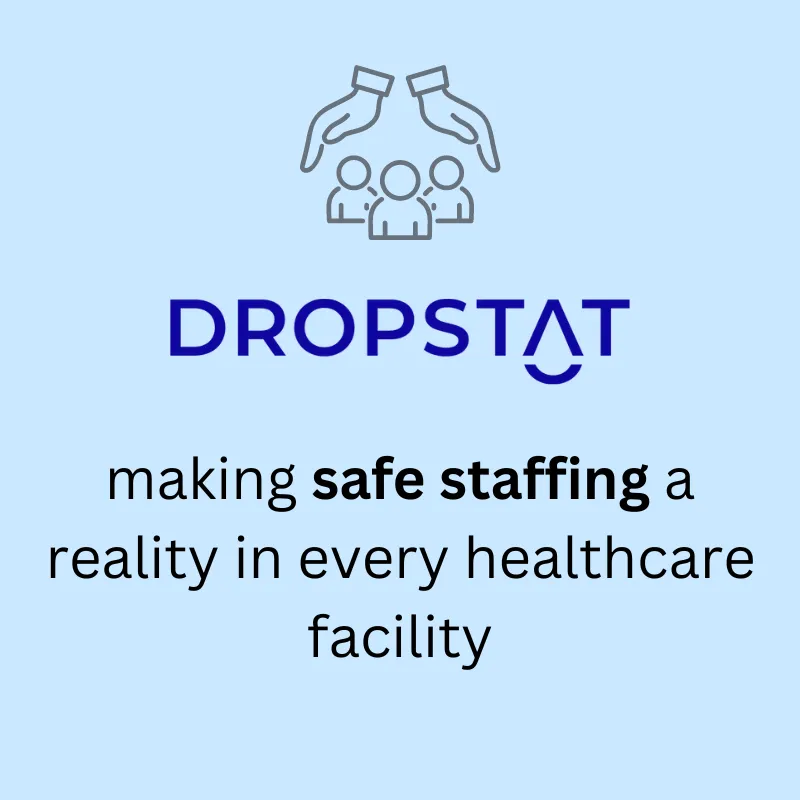The pillars of a healthy nurse patient relationship
The nurse-patient relationship is an important part of providing compassionate patient care. This type of connection, referred to as a therapeutic relationship, has the potential to drastically improve patient satisfaction and overall health outcomes. Three main characteristics help cultivate this strong bond: trust, communication, and empathy between the parties involved, nurses and patients alike. Nurses should consider these attributes when attempting to create a healthy nursing-patient relationship that can make all the difference in terms of delivering high-quality healthcare experiences for those receiving treatment or support from nurses.
Establishing trust as the bedrock of a nursing relationship with patients
The cornerstone of an effective therapeutic nurse-client relationship is built on patient trust. For nurses to be able to offer quality care, gaining the confidence and faith of their patients is key. To do this, they must demonstrate respect by spending enough time engaging in conversation, using active listening techniques that show impartiality, and giving privacy when necessary.
Nurses should seek permission before entering a patient’s room and before delivering any medical assistance with courtesy. An apologetic demeanor is advisable if there are delays. Consistent results within team dynamics, as well as following up on feedback from people under health monitoring, help create a therapeutic relationship facilitated by mutual understanding and established through respectful communication practices.
These caring practices are part of nursing values that generate assurance between personnel along with positive interactions among patients, paving the way to successful outcomes in building trust in nursing. Establishing productive nursing and patient relationships is anchored firmly around respectfulness, for example, avoiding using a lot of medical jargon.
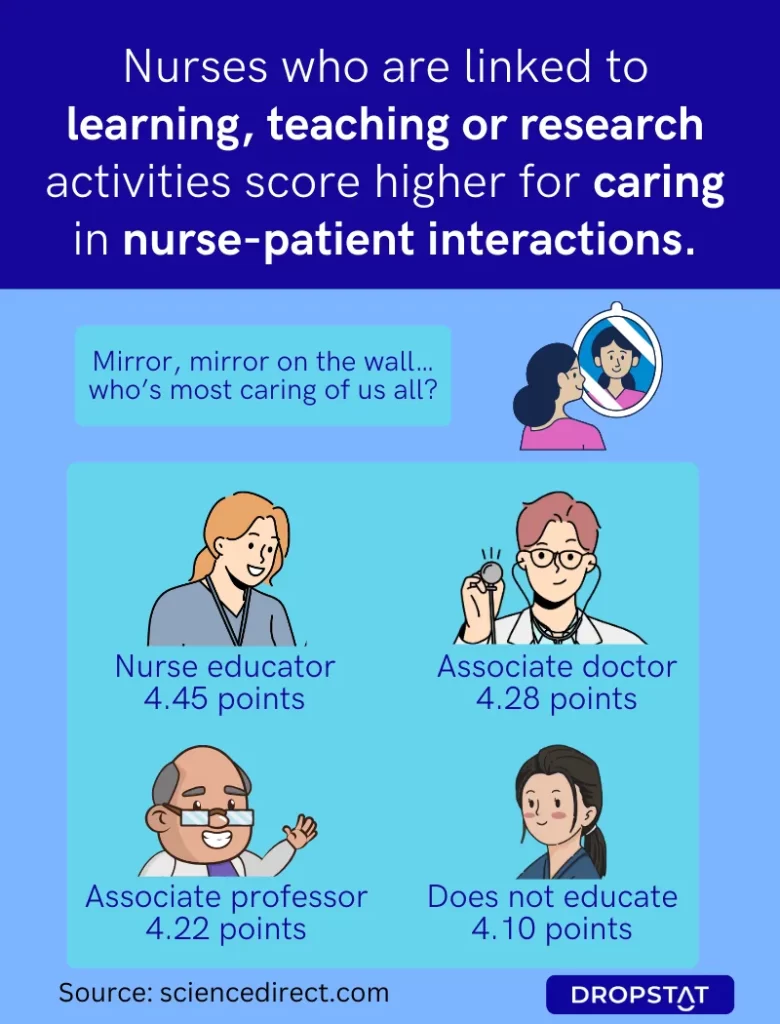
Communication: The heart of the nurse patient relationship
Nurses must foster effective communication to establish beneficial nurse-patient interaction. Strategies such as active listening, touch that is administered in a professional manner, and encouraging the patient’s expression of emotions can be used during therapeutic techniques implemented by nurses. This includes sharing opportunities for coping strategies, resulting in better patient satisfaction and health outcomes.
Particularly at the start of the relationship between nurse and client or the orientating phase, actively listening is important while maintaining eye contact with patients so they feel secure enough to communicate their feelings honestly. Paying attention to nonverbal communication when developing this bond will lead to an improved therapeutic relationship.
Empathy in the nurse-patient relationship
Nurses can provide compassionate care and demonstrate empathy in order to foster trust between them and the patient. This is an important part of nursing as it leads to improved health outcomes, reduced recovery time, greater well-being for the patient overall, and more successful rehabilitation efforts. Studies show that when nurses display empathy with patients, patient anxiety is lessened, leading to patient trust in healthcare and positive healthcare results.
Enhancing patient safety through strong nurse and patient relationships
The nurse-patient relationship is essential for ensuring patient safety in various aspects such as:
- decreasing hospital stays
- providing high-quality health care and
- making sure that all the needs of patients are respected.
It also helps to ensure mental health recovery and physical well-being within healthcare settings by encouraging respectful communication between both parties.
The connection established through a therapeutic nurse patient relationship is beneficial when it comes to advocating on behalf of and promoting better understanding between nurses and their patients. This improves overall levels of satisfaction from all healthcare stakeholders while boosting morale concerning health issues.
The impact of a positive nurse patient relationship on mental health recovery
A positive nurse patient relationship is especially important for successful mental health recovery. This includes expressing hope for recovery and focussing on positive aspects in the patient environment and healthcare journey – the silver lining that is present in every cloud.
A positive nurse patient relationship can:
- shorten the period of hospital stays
- boost patient satisfaction, and
- allow nurses to detect medical and nonmedical factors that influence a person’s psychological well-being.
Empathy also plays an important role in this type of collaboration when it comes to providing mental health treatment – especially regarding trust building, creating a comfortable atmosphere that facilitates collaboration between the patient, their family, and health care staff while decreasing any perceived stigma at the same time. A healthcare professional who practices empathy puts patients on their road to emotional recuperation. Actively listening or chatting with patients, even for only a few minutes, leads to better communication, patient care, and satisfaction.
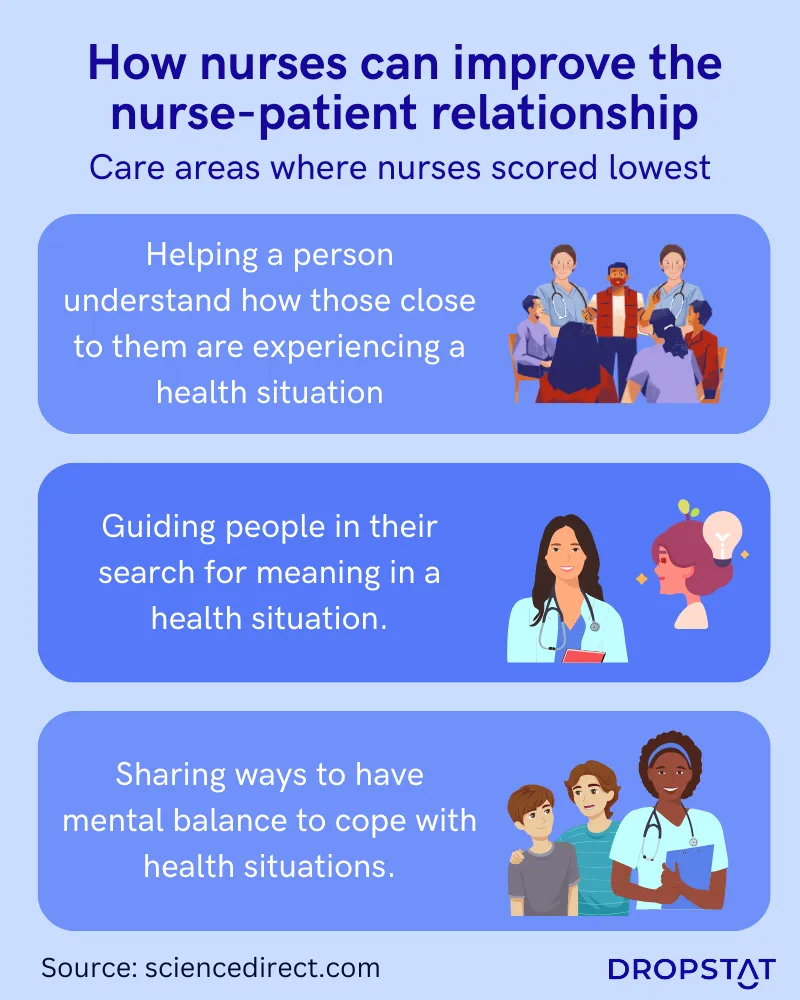
Physical well-being, safety in nursing, and recovery
The relationship between a nurse and their patient can have an immense effect on the health, security, and contentment of patients.
Health
A strong patient nurse relationship leads to shorter hospital stays with better health outcomes due to improved quality care that is backed up by appropriate follow-up treatment.
Security
Nurses’ views towards patient safety culture improve, with fewer occurrences of medical harm or accidents happening within a facility environment.
Contentment
Such connections also reinforce effective communication between both parties, which strengthens trust in one another, leading to greater overall well-being for those involved.
3 Strategies for nurturing patient and family
Building trustworthy nurse-patient relationships is essential for a successful healthcare journey. Here are guidelines to strengthen the nurse-patient bond, allow patients to participate in treatment decisions, and involve family members in this important connection.
1. Spending quality time with patients
Establish a connection with patients by promoting trust and creating a strong nurse-patient relationship. The best way to achieve this is through regular follow-up, during which nurses can dedicate time to listening actively to the patient’s needs or offer emotional support and patient education about the patient’s health situation. Investing quality time in nurturing patients in this way is beneficial; it helps improve the patient’s trust and enhances nurses’ professional satisfaction and career experience.
In order to build an effective bond between nurse & patient, it’s important that there are shared experiences, including conversing, storytelling, and participating in joint therapeutic activities.
2. Allow active participation in the decision-making process
Nurses can actively listen to patients’ concerns and preferences when engaging them in the decision-making process. This strengthens the nurse-patient relationship, which is crucial for building trust between both parties as well as promoting patient satisfaction and optimal health outcomes. Nurses must also employ effective communication strategies, such as speaking using clear language while being conscious of nonverbal cues during interactions with patients. These efforts enable better understanding among all participants involved.
3. The role of the patient’s family
Family members have an essential role to play in the nurse and patient relationship. By showing empathy while practicing active listening and creating eye contact when introducing themselves, nurses can establish a stronger connection with both patients and their loved ones. Involving family throughout decision-making processes leads to improved communication between all parties involved and better health outcomes that focus on patient-centered nursing care, even while recalling the ever-present need for efficiency in healthcare. Through recognition of families’ rights over medical decisions, they are able to be advocates for individual preferences as well as provide emotional support, which contributes positively towards overall healthcare success.
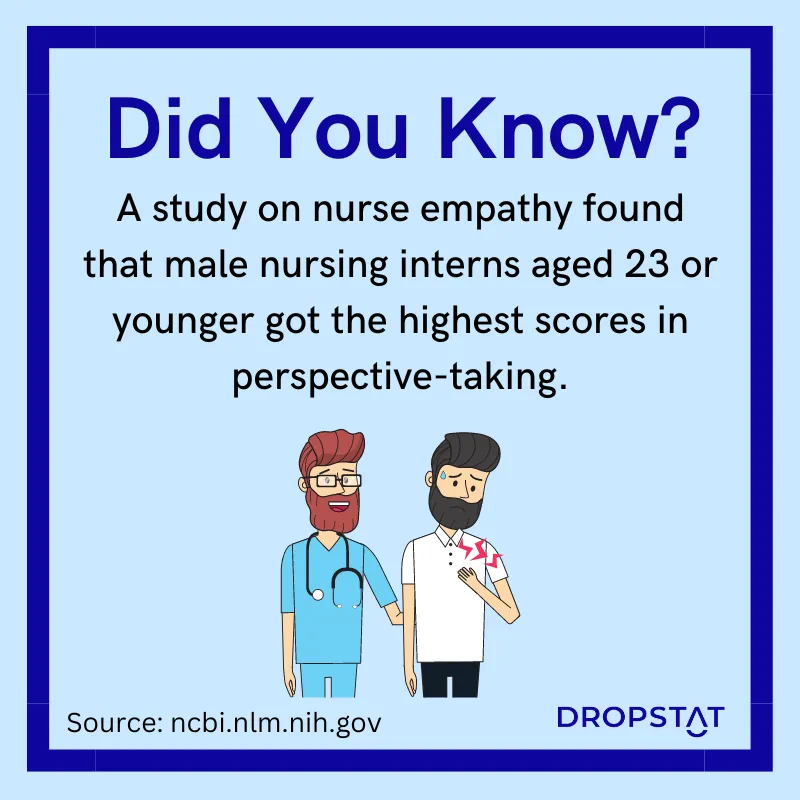
4 influences of staff scheduling on the nurse-patient relationship
When scheduling nurses, the following points can be adopted to ensure consistent nurse patient relationships throughout the patient journey:
1. Balancing work-life
Sustaining a healthy work-life balance is essential for nurses to ensure optimal patient care. High stress levels and burnout among nurses can have negative effects on the quality of service they deliver, such as a reduction in empathy towards patients, lack of engagement with them emotionally, and emotional fatigue. An empowering working environment is conducive to keeping a steady balance between professional duties and personal obligations.
2. Appropriate staffing levels
Nurse managers are required to spearhead efforts at maintaining a staffing equilibrium by promoting collaboration within teams, such as by cross-training, to provide staffing support among medical personnel. Maintaining adequate staffing by having sufficient staff with adequate qualifications is also essential in every healthcare landscape to improve safety in healthcare.
3. Nurses working hours
Nurses who work the night shift, work mandatory overtime, or work when they would rather a vacation request be approved will be challenged in maintaining a pleasant nurse-patient relationship. Long shifts and inflexible schedules potentially undermine the nurse-patient relationship.
4. Nursing care programs
To prevent the negative outcomes from poor scheduling practices, nurses can participate in care programs that measure and track staff strain levels, physical well-being, and nurses’ mental health needs. Allowing nurses to take time out occasionally for self-nurturing activities within the employment scope, like leisure pursuits, can build nurses’ emotional powerbanks and contribute positively to the nurse-patient relationship.
To guarantee that these relationships remain strong, it may be beneficial to use scheduling software that can help maintain stability in the entire nurse-patient dynamic.
How Dropstat’s app supports the nurse patient relationship through effective scheduling
Nurse scheduling software is an invaluable resource for healthcare institutions in helping to manage employee schedules, store vital worker data, and ensure that all necessary care staff roles are adequately staffed. Through the use of predictive algorithms, Dropstat assures consistency in scheduling while promoting effortless communication between nurses and staffing managers. Through supporting a healthy staffing dynamic, nurses are empowered to maintain their professionalism and idealism and offer patients top-quality nurse patient relationships.
Nurse scheduling technology ultimately aids in strengthening the nurse-patient relationship by optimizing the overall quality of service from patients’ perspectives. The implementation thereof also simplifies difficult tasks such as shift customization, among other core features that Dropstat offers to maintain efficient nursing practice.
Schedule a demo with Dropstat to experience how nurse scheduling can positively influence the nurse patient relationship.
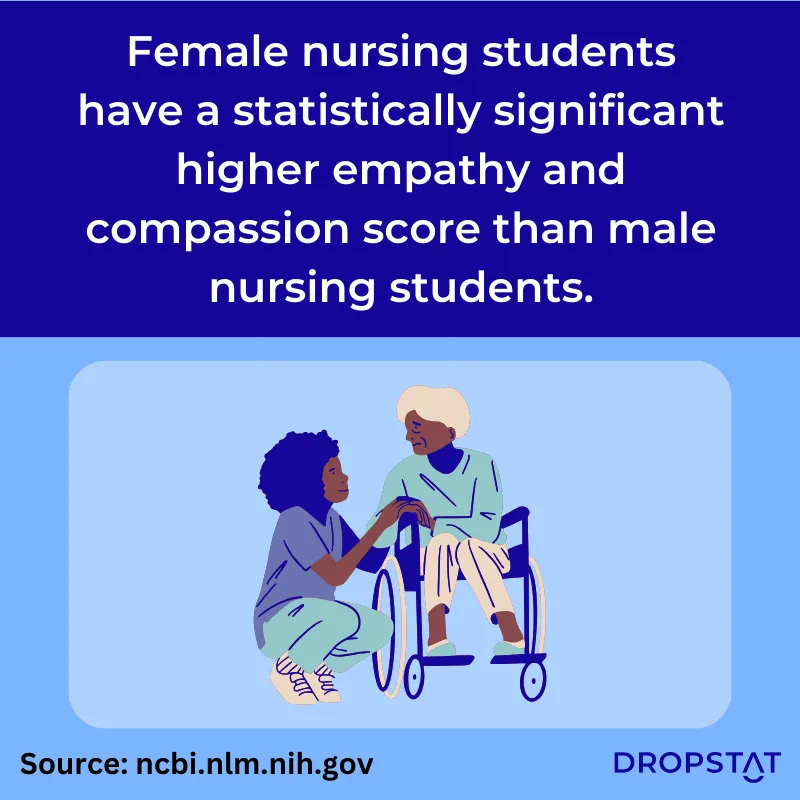
Nurse patient relationship FAQs
For safety in nursing, what is the central goal of establishing professional boundaries?
Having professional boundaries in place is essential for upholding a therapeutic relationship that meets the demands of both parties, enabling them to mutually benefit. These limits should help promote an environment that respects each other’s needs and values. Nurses have professionalism and care to offer, and patients need to receive these through therapeutic relationships. Maintaining a professional relationship to patient populations protects nursing staff physically and emotionally, strengthens personal boundaries, and helps them offer care in the most effective, sustainable manner.
What are some strategies nurses can use to build patient trust?
Nurses can foster trust with their patients by listening attentively, speaking openly and honestly to them, keeping confidential information secure, and showing compassion. Through actively being present for the patient in a respectful manner while exhibiting empathy, nurses can build meaningful connections.
How does communication with patients and family members fit into the nurse patient relationship?
To aid effective communication, nurses should practice attentive listening when discussing the concerns of the patient and their family. Nurses must practice good verbal and nonverbal communication skills: use easily understandable language, pay attention to body movements, and keep eye contact when talking with patients and their family members. Nurses face ethical dilemmas when there is a conflict between the care wishes of the patient and the patient’s family. Sometimes, what appear to be conflicting options can be aligned by the nurse articulating the medical rationale for the choices available.
